
16 minute read
FIU in DC
Green School receives top award for promoting student internships in D.C.
Each year, college and university students from around the world converge on our nation’s capital to pursue real-life experience in government, nonprofit organizations, public and private foundations and corporations.
Many of them find their way to D.C. through The Washington Center, an independent nonprofit that connects young people to experiential learning opportunities in the public, private and nonprofit sectors.
Natalia Kolbjornsen ’17 landed an internship in Washington, D.C., through The Washington Center.
Since FIU began collaborating with the center in 2012, the university has become one of the top contributors to the organization’s pipeline of young talent. “FIU exemplifies the best of our partners, with its deep commitment to providing opportunities for transformational internship experiences to their students,” said Saima Siddiqui, vice president for development, alumni and university relations at the center. “FIU has been one of the most consistent contributors to our enrollment, routinely ranking among the very top of our partner institutions.” In fact, for the past five years, FIU has sent more students to internships through the center than any other university in Florida, with more than 200 students traveling to D.C. for positions – nearly a quarter of all the students from Florida. This year, FIU was the No. 2 contributor of student interns to the Washington Center from more than 400 partner institutions around the country, with 28 students placed in internships in 2019.
In October, the center recognized FIU with its Higher Education Impact Award at the 2019 annual scholarship dinner.
“This year’s theme is “Bridging to the Future,” and we feel that FIU exemplifies leadership and impact in higher education and continues to play a substantial role in creating access for students to participate in these transformative experiences,’’ Siddiqui said. While the internships are open to all students at FIU, the partnership is overseen by the Steven J. Green School of International & Public Affairs, with support from FIU’s Career and Talent Development Department, as well as FIU in DC, the university’s hub in the capital.
Researchers launch network on health and society New initiative seeks to connect social sciences to health care and public policy
The Research Network on Health and Society – led by a team of researchers in the Department of Global & Sociocultural Studies – is examining issues like access to health care and health care inequalities through the lens of economics, history, sociology and other social sciences. “The Green School has a growing portfolio of health-related research from the perspective of the social and policy sciences,’’ said Mark Padilla, a medical anthropologist with extensive research experience in public health, including several studies funded by the National Institutes of Health (NIH). He leads the new initiative along with Professors Nelson Varas-Diaz and Sheilla Rodriguez Madera. “We’re talking about the social determinants of health, we’re talking about structural violence and issues that affect large populations in terms of health inequalities,’’ he added. “We’re talking about all kinds of issues that are related to health and wellbeing but are not necessarily clinical outcomes.’’
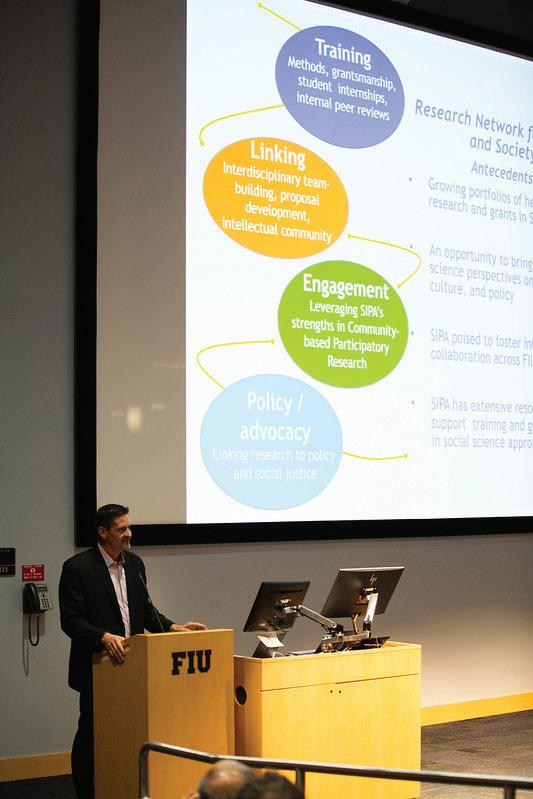
The network is housed within the Kimberly Green Latin American and Caribbean Center, as the work focuses on disadvantaged and marginalized populations in the Global South, a term used to describe less-developed regions of the world, including areas of Latin America and the Caribbean.
“We often hear that the university is a solutions-based center and this research network is committed to providing solutions to the challenges that we face today,’’ said Frank Mora, former director of LACC.
Professor Mark Padilla discusses the Research Network on Health and Society. Community engagement is another significant aspect of the initiative. The launch included two photo exhibits that illustrate the power of connecting the community to social science research.
Neighborhoods of Refuge features work by persons experiencing homelessness in Overtown and other areas of Miami. It is a collaboration with Camillus House. The second exhibit, Mi Vida con VIH/My Life with HIV, was created by Latino and Latina activists/artists living with HIV/Aids in Miami, in collaboration with the community organization Pridelines.
National Institutes of Health awards FIU grant to study cancer screening among transgender Latinos
While transgender men and women have a higher risk of breast and cervical cancer, internalized stigma related to body image and gender identity may make them less likely to undergo preventive screenings for the diseases. The National Institutes of Health (NIH) has awarded a team of social scientists from the Green School a $398,000 grant to study barriers to such screenings and how culturally sensitive, targeted interventions can support transgender persons in overcoming these barriers. “Transgender men and transgender women have been under-studied with regard to reproductive cancer risk and there is very little information on how the disease affects their lives,’’ said Sheilla Rodriguez Madera, a professor in the Department of Global and Sociocultural Studies and one of the principal investigators of the project, along with professors Mark Padilla and Nelson Varas-Diaz
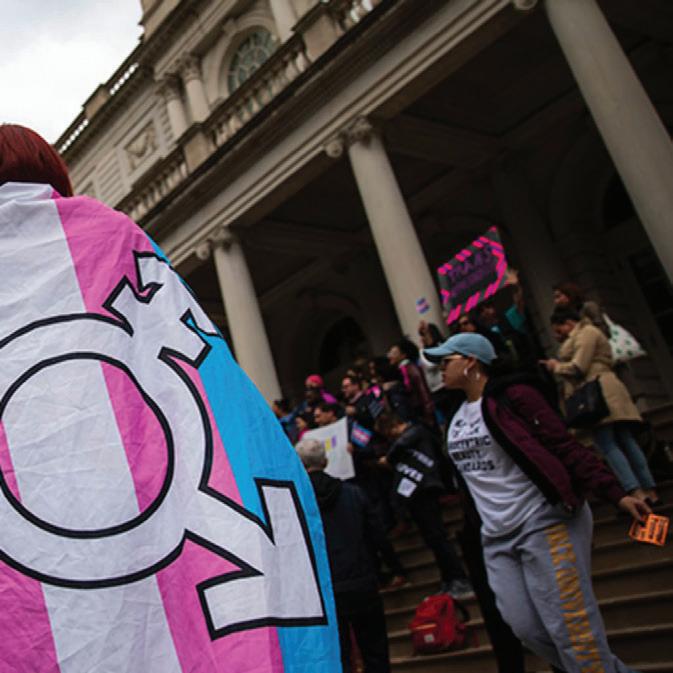
A collaboration with researchers in Puerto Rico and San Francisco, the study will focus on Latino transgender communities in San Juan, Puerto Rico and Miami, with the aim of reducing health disparities experienced by these populations.
Documentary examines politicization of Hurricane Maria death toll in Puerto Rico
After Hurricane Maria devastated the island of Puerto Rico with Category 4-force winds in September 2017, government officials placed the death toll at 64, drawing intense criticism from experts and local residents. A study from Harvard University later estimated the actual death toll to be far greater – more than 4,600. A team of researchers from the Green School, some of whom were in Puerto Rico when the storm hit, have produced a new documentary that examines how the storm’s impact became the subject of a highly politicized debate, calling into question the science behind how hurricane damage is assessed. “It reflects on the deteriorating relation between science and government and the growing erosion of trust in key institutions, even on something like disaster management, which has historically been one of the least politicized areas of government practice,’’ said Nelson Varas-Díaz, professor in the Department of Global & Sociocultural Studies (GSS) and the director of the film.
“Collapse” – the title of the film, referring to the collapse of Puerto Rico’s healthcare system after the storm – has been accepted into several film festivals and received numerous awards.
Varas-Díaz, who has produced several award-winning documentaries, collaborated on the project with fellow GSS professors Kevin Grove, Mark Padilla and Sheilla Rodríguez Madera.
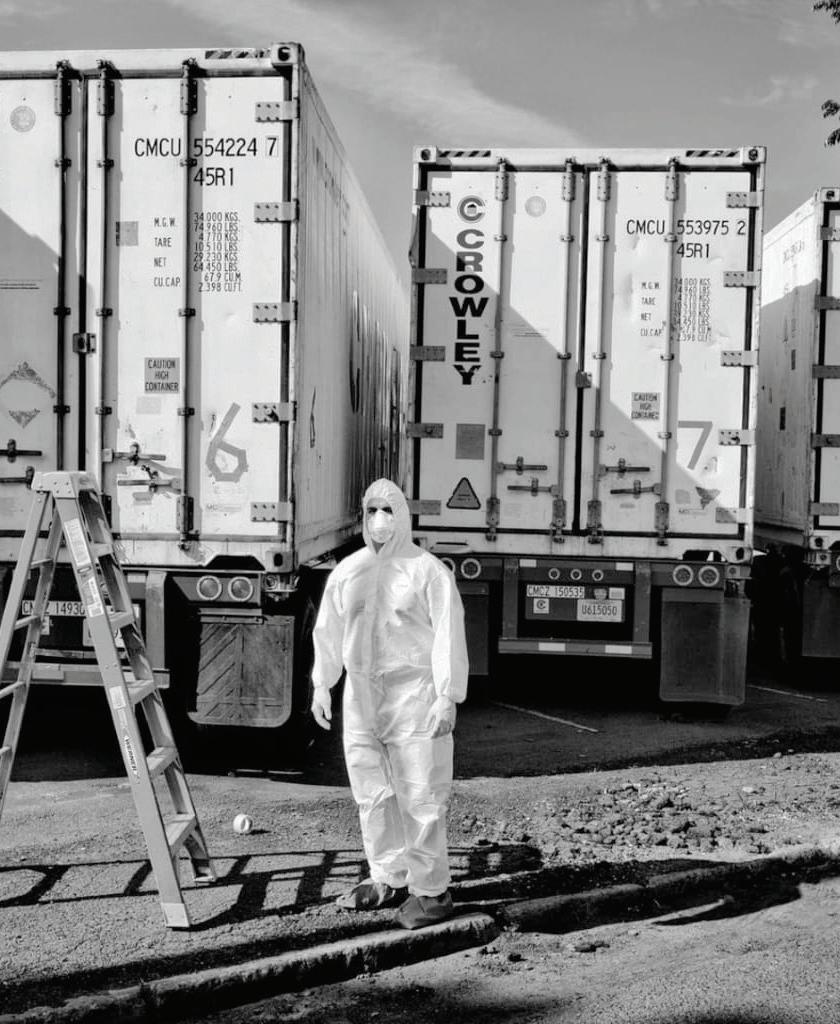
The Humanities Edge awards first research grants to Green School projects
Sociology professor Matthew Marr knows just how critical proximity to social and public health services can be in a neighborhood where homelessness is an ongoing concern. During his research, he learned of a homeless man in Overtown who happened to bump into a former caseworker. The homeless man asked for help. This led to his finding housing and getting assistance. Marr, associate chair of the Department of Global and Sociocultural Studies, explores homelessness in Overtown as part of a long-term comparative research project, Neighborhoods of Refuge. The project explores how the homeless population live and how the local government interacts with them in cities like Miami, Los Angeles, Osaka and Tokyo. Marr is among the first in a group of faculty and students from FIU and Miami Dade College selected to receive $10,000 grants for research in the humanities. The grants were awarded through The Humanities Edge – an academic and career development program funded by the Andrew W. Mellon Foundation to support MDC-to-FIU transfer students in the humanities. Marr and History Professor Ken Lipartito were the first recipients of The Humanities Edge collaborative research grants at FIU. Lipartito earned his grant for Free Blacks of Florida, a research project exploring the lives of African Americans – both slaves and free – in Florida during the 1840s and 1850s. His project includes the digitalization and transcription of historical documents from the Key West Public Library, which include court cases, citizenship and immigration papers and other state papers. Lipartito will enlist the help of students to transcribe the documents, helping them gain key research skills. “We want to uncover their experiences, document the difficult negotiation between slavery and freedom that African-Americans in Florida were subject to, and gain a greater understanding of the legal issues,” he said.
Professor Matthew Marr
Professor Ken Lipartito
Criminal Justice professor works with Miami police to create real-time crime center
From left, criminal justice professor Robert Guerette with City of Miami Police Lt. Jaime Rodriguez, FIU student Kimberly Przeszlowski and Miami Police Maj. Jose Rodriguez at the Miami Police Department’s Real-Time Crime Center
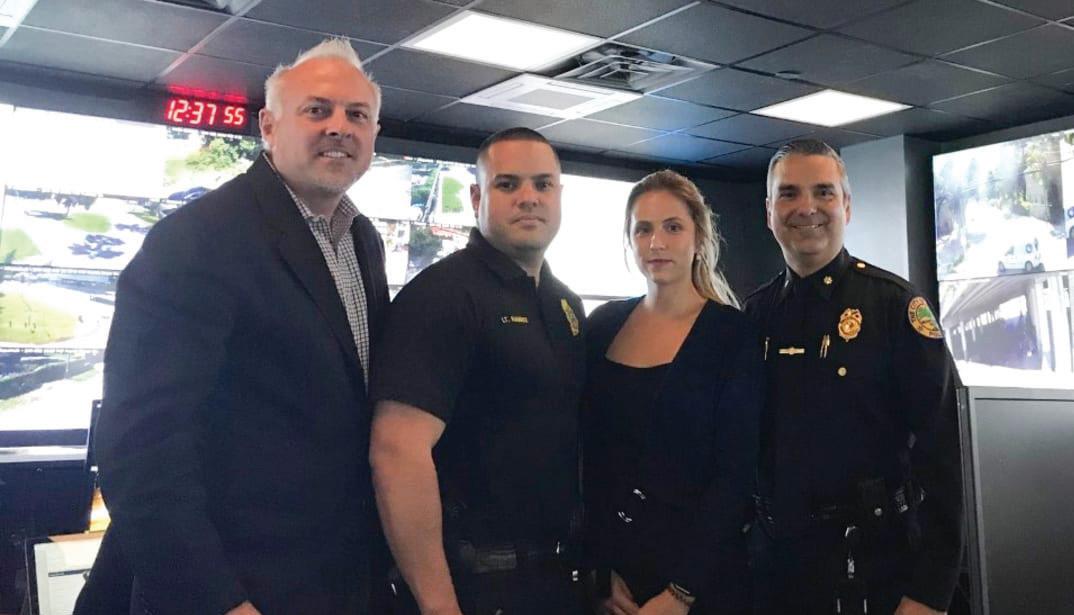
To give officers more information before they encounter a potential suspect, criminal justice professor Rob Guerette worked with the City of Miami Police Department to build and evaluate what is known as a real-time crime center or RTCC.
“In the age of information, technology and data, the purpose of the real-time crime center is to harness all of the available information that is out there and deliver it to responding officers in real time so that they can make better decisions,’’ Guerette said. “[This system will allow them] to investigate and solve crimes with better information, which will hopefully lead to better outcomes.” To implement the center, Guerette and the Miami police department received a $700,000 grant from the U.S. Bureau of Justice Assistance (BJA). This is the second round of funding for Guerette’s work. The first phase was a $600,000 grant to help enhance the department’s crime analysis unit. Working with two students in the international crime and justice doctoral program—Joelle Lee-Silcox and Kimberly Przeszlowski—Guerette refined the Miami police department’s crime analysis techniques and assisted in overhauling the department’s data systems.
“We hope to arm officers with information to make the community safer,” Guerette said.
The project is an example of the many recent technological developments in law enforcement, such as body-worn cameras and biometrics, that have had far-reaching effects on police agencies, said Professor Lisa Stolzenberg, chair of the Department of Criminology and Criminal Justice, a part of the Steven J. Green School of International & Public Affairs.
“It aligns perfectly with our new bachelor’s in crime science degree, which integrates the latest advancements in forensics and computer science with traditional criminology and criminal justice, as well as the Ph.D. program in international crime and justice,’’ she said.
Researchers show adverse childhood events contribute to lower self-control among teens
Adverse childhood experiences (ACEs) are known to lead to a number of negative health and behavior outcomes, including delinquent and criminal behavior. A new study by FIU criminal justice researchers found exposure to adverse childhood experiences is also associated with lower self-control in teenagers, especially when those experiences are related to maltreatment. Researchers found that a greater variety of adverse experiences in childhood leads to lower levels of self-control in later years, particularly experiences that reflect exposure to abuse, neglect and family violence. Other experiences related to household dysfunction, such as substance abuse and mental illness in the family, separation or divorce and parental incarceration, were also found to be detrimental for self-control but to a lesser degree than the maltreatment-related ACEs. “Decades of research tells us that having good self-control
Researchers assess racial disparities in prosecutor behavior

To promote fairness and transparency in the criminal justice system, researchers at FIU and Loyola University Chicago partnered with prosecutors in Tampa, Chicago, Jacksonville and Milwaukee to take a fresh look at prosecutorial performance and decision-making. Funded by a $1.7 million grant from the John D. and Catherine T. MacArthur Foundation—the largest MacArthur grant ever awarded to FIU—the project aims to identify racial and ethnic disparities at various stages of a criminal case, from arrest and charges being filed to plea agreements, conviction and sentencing. Researchers from FIU’s Department of Criminology and Criminal Justice assessed nearly 87,000 cases from 2017 and 2018 to compare outcomes for Black, white and Hispanic defendants in Hillsborough County, Florida. Although there were differences between racial groups, the disparities were not glaring, researchers found. “Among multiple prosecutorial and judicial decision points analyzed, racial and ethnic disparities are not large,’’ said FIU criminal justice professor Besiki Kutateladze, who along with Loyola professor Don Stemen, FIU associate professor Ryan Meldrum and post-doctoral research associate Rebecca Richardson, led the project, housed within the Center for the Administration of Justice at the Steven J. Green School of International & Public Affairs. “Whenever differences among white, Black and Hispanic defendants in prosecutorial and judicial decisions exist, whites are more disadvantaged for some decision points and offense categories, and blacks and Hispanics are more disadvantaged for others,’’ Kutateladze explained. The racial disparities report is the second in a series of publications to come from the MacArthur Foundation project.
can have impacts on physical and mental health, education and employment outcomes,’’ said Ryan Meldrum, associate professor in the Department of Criminology and Criminal Justice and the lead author of the study. “Given this, understanding the factors that may contribute to deficits in self-control is critical. Even though we approached the topic through a criminological lens, the findings of our study are relevant to a number of disciplines, including public health, sociology and education.’’ Funded in part by a grant from the Centers for Disease Control and Prevention, the study was a joint effort by researchers from FIU, Florida State University, Wayne State University, Eastern Michigan University and Michigan State University.

FIU in the Middle East Studying abroad in Jordan, Israel and Palestine
New program supported through the Kimberly Green Scholarship, the Dorothea Green Lecture Series Endowment and the President Navon Endowment for Sephardic and Mizrahi Jewish Studies Riding camels in the desert. Floating in the Dead Sea. Exploring some of the most revered and sacred religious holy sites of major world religions. And experiencing Middle Eastern hospitality. This is just a glimpse of the jam-packed, 14-day study abroad adventure a group of students experienced this summer during their trip to Jordan, Israel and Palestine. This pilot program marked the FIU in the Middle East program’s first study abroad trip to the region. The group journeyed to famous cities including Bethlehem, Nazareth, Jerusalem and Haifa. They visited renowned museums such as Yad Vashem: The World Holocaust Remembrance Center and the Museum of the Jewish People. The trip was in conjunction with two courses, Politics of the Middle East and Topics in International Relations: ArabIsraeli Conflict, taught through the Department of Politics & International Relations. Here are some highlights of the trip as told by the students and their professor.

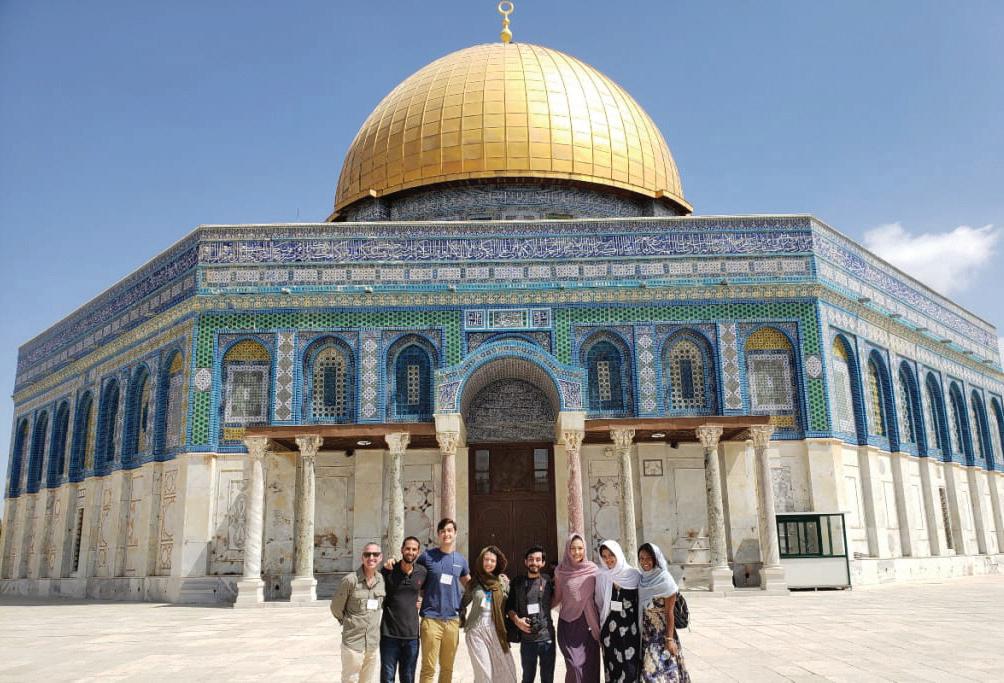

GABRIELLA ROLDOS Junior, International Relations “We went to Petra!!! The natural architecture was mesmerizing. I don’t think I will ever see something like that again in my life. I can also officially say I was on the set of Aladdin. Well, not technically. I really was in Wadi Rum. We were able to do things such as ride camels and sit in a Bedouin tent. At the Dome of the Rock, I witnessed a Muslim pray for the first time. There is a certain beauty to watching someone pray, a certain vulnerability that comes from seeing a person and their faith colliding. This trip was very easily the trip of a lifetime for me.”
LAURA LAVERDE Senior, Political Science “I got to experience something I only imagined in my dreams. We went to Wadi Rum, which is one of the most beautiful places I’ve been in my life. We got a Jeep ride through the desert, and I felt like I was in a Star Wars movie. The landscape was breathtaking. We walked the “Via Dolorosa” where Jesus walked with the cross. And we had the honor to be part of a Shabbat dinner, where a Jewish family opened their doors to teach us about their culture while enjoying a family dinner. Not only the food was delicious, but the family hospitality was out of this world. We talked for hours.”


Studying abroad in Jordan, Israel and Palestine


SEBASTIAN MELENDEZ Sophomore, Economics “The first day of the trip, we went up to Mount Nebo, the place where Moses looked over the Holy Land. From there you can see the Dead Sea, the Jordan River and one of the oldest cities in the world, Jericho. We also saw the oldest map of the Holy Land and visited the Jordan River to see where Jesus was baptized. Another highlight: We drove up to Acre, which was my favorite city. The architecture and the sea walls are among some of the longest standing and most historic structures. It was different from anything we had seen.”




TANIA ALVERADO Junior, International Relations “After our site tour of the Jordan Valley, we attended a meeting in Amman about Muslim and Christian coexistence. It was beautiful to see how both religions are similar. To see both of these important religious figures, a priest and a mufti, connect with each other and recognize that they can coexist without any difficulties was breathtaking. Coming into this trip, I did not know all the similarities Christians and Muslims had, which is an eye-opening experience.”
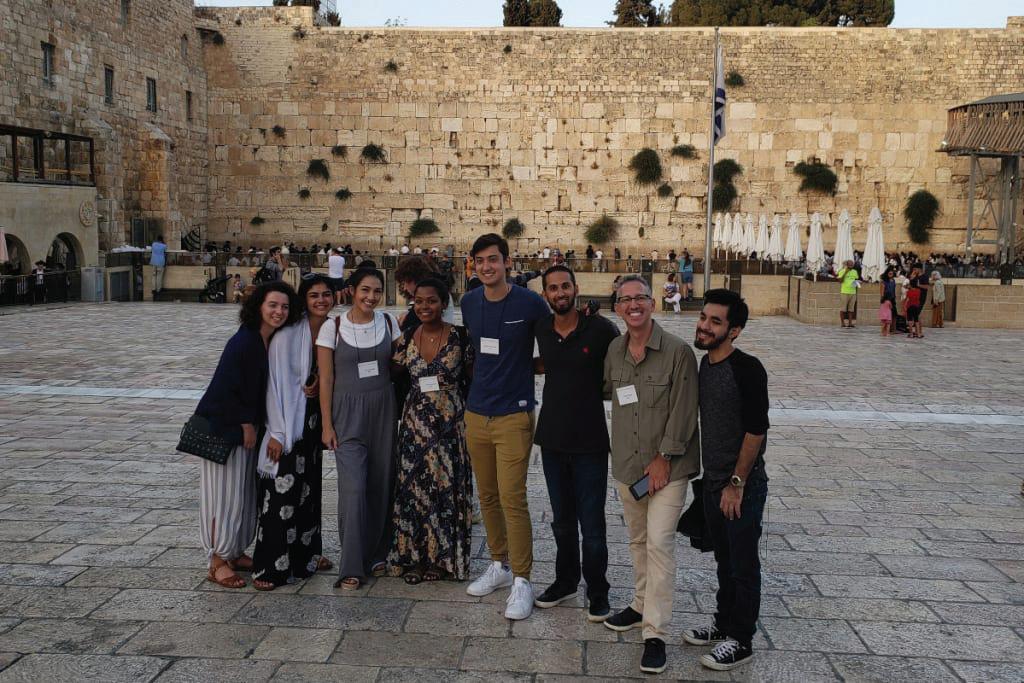

MOHAMED K. GHUMRAWI Faculty Director, FIU in the Middle East Adjunct Professor, Department of Politics & International Relations “This study abroad trip was an amazing opportunity for our students to become immersed in the region of the Middle East. It is one thing to learn about something from a book in a classroom. It is another to actually travel to and directly interact with the region you are studying. Traveling is one of the best methods of learning. I believe it’s very important to give our FIU students an opportunity to receive a high-quality and life-changing experience like this program provided.”










